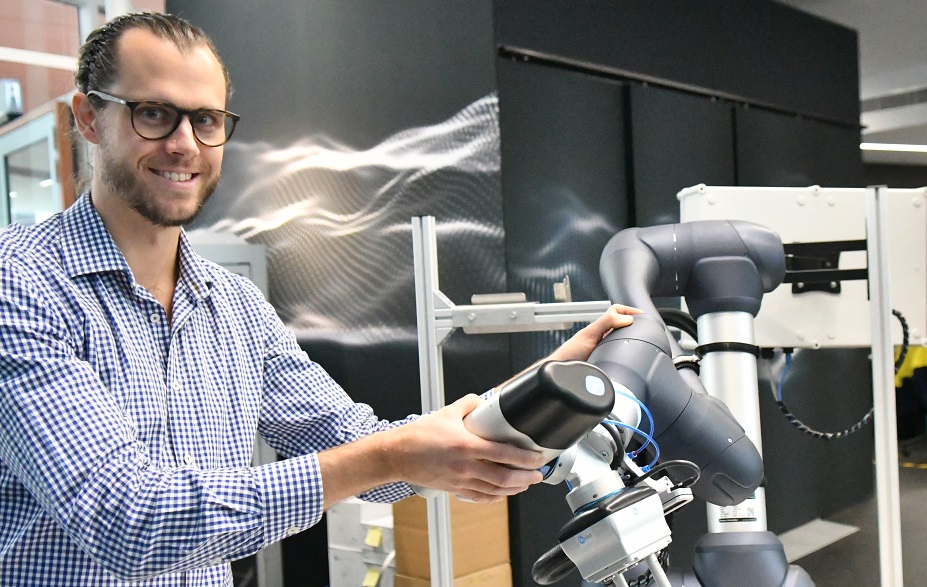
Having recently joined the new Digital Transformation Lab as a mechanical and biomedical engineer, Robbie Trott works across two research worlds. He explained that he thanks his friends for fostering his dual skillset and why this means no two work days ever look alike.
What is your role and what does your work focus on?
I’m a mechanical and biomedical engineer at the Digital Transformation Lab at Tonsley. I bring a specialist physiological measurement and monitoring capability to the lab, which complements our work in research trials conducted as part of the Innovative Manufacturing CRC (IMCRC).
More broadly, my work focuses on seeing how people work (their posture, their effort and stress, among other things) and how this impacts their ability to work. My other work as a mechanical engineer involves general problem solving and I’m currently undertaking a project to enhance our metrology capability (measurement and validation).
What journey brought you to this point in your career?
I began a mechanical engineering degree, but two years in I was always looking over the shoulders of my friends doing biomedical engineering degrees, so I made the switch to a double degree combining the two. I’ve just submitted a PhD in biomedical engineering that involves neuroscience, mechanical design, electronics and a participant trial. I’ve also done work with Naval Group Pacific and have made sure I’m constantly involved in professional development.
What is something you love most about your work?
Giving tours of the lab and engagement. I love communicating the work I do, as well as the work of my group. I get to talk to new people and share ideas. Most of what we learn is from other people and I get a lot of opportunities to understand other people’s problems, which is important if I am going to find engineering solutions for them.
What is something you are most proud of?
I’m very proud of my Warman Design and Build Challenge teams that I mentor in the second year of Mechanical Engineering degrees. Since I began mentoring a team in 2018, the Flinders team has ranked second nationally in a competition that was modified for COVID-19 and showed the strength of engineering talent at Flinders. I actually don’t have to do much – a bit of admin, and I nudge the student trajectory with my experience – but I am an enabler. I give them access to resources, such as out-of-hours time in the labs, so they can excel in a way that accommodates the other commitments they have in their lives.
It’s a great model and I am proud of the effort and the growth I see in the teams.
What would you like people to know about your role?
I am a researcher and an engineer. Most people know about the former and can picture someone doing research (usually in a white coat), but if you ask what an engineer does people scratch their heads, but all they really need to do is to look around and see the engineered world we live in.
What does a normal day look like for you?
I’m constantly trying to find out what I don’t know. A good proportion of my day is spent reading and planning. Otherwise, I’m working through new problems in my various projects and hosting tours of the lab every couple of days. I do a mix of everything from human participant data collection, design, electronics and programming, to testing new technology and ideas.
How do you like to relax ?
I have a motorcycle, do bouldering, and train mostly for running. I also really enjoy reading books, mostly of the fantasy genre.

